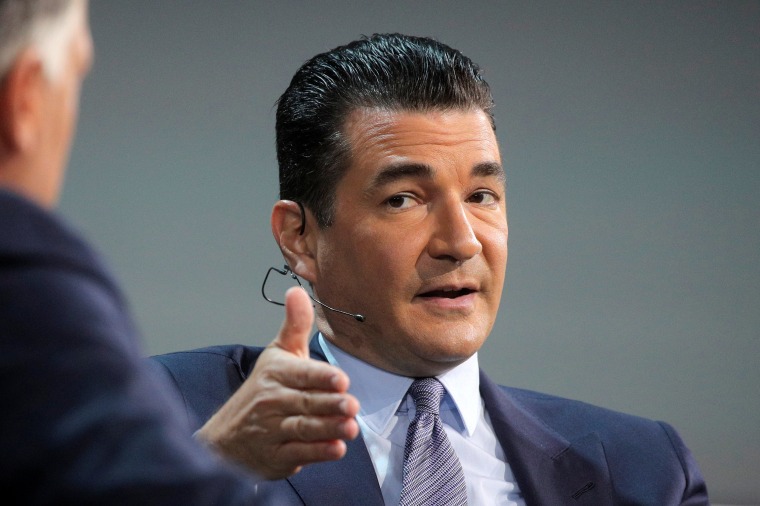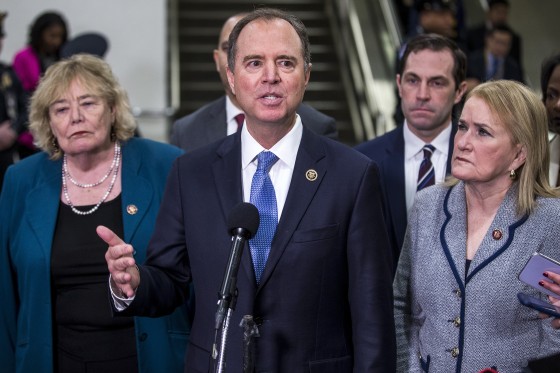WASHINGTON — The House Intelligence Committee voted Thursday to create a new office — and new authorities — to push U.S. intelligence agencies to provide earlier warnings about disease outbreaks and pandemics.
A provision that committee Chairman Adam Schiff, D.-Calif., inserted into the bipartisan annual intelligence authorization bill — which was voted out of committee in a classified session late Thursday afternoon and is likely to become law — would create authorities to counter foreign biological threats, a committee official said on the condition of anonymity.
The legislation, if it is signed by President Joe Biden, would change the name of the National Counterproliferation Center — a department of the Office of the Director of National Intelligence that focuses on containing the spread of nuclear, biological and chemical weapons — to the National Counterproliferation and Biosecurity Center, reflecting its new responsibility of focusing on disease threats.
The official said the bill's classified annex includes several provisions to boost pandemic preparedness and global health security.
The provisions were drafted based on the results of a mostly classified so-called deep dive by the House Intelligence Committee into how the spies dealt with the coronavirus pandemic and whether the CIA and other agencies should be doing more to collect medical intelligence, congressional officials said. The review concluded that the spy agencies should play a more prominent role in gathering information that could help policy-makers be more visible in the early days of health crises.
"One of the gravest threats that has plagued our country for the past 18 months is the coronavirus — a pandemic that's wreaked havoc on the economic stability, health and safety of communities throughout the country," Schiff said. "It is critically important that we be better prepared for the next health threat, which is why the committee is working diligently to improve the intelligence community's position to face the next pandemic."
Intelligence gathering is viewed as especially important if a pandemic arises in an authoritarian country such as China, which has not been transparent about disease outbreaks. U.S. officials and outside experts say the Chinese government initially covered up the extent to which the coronavirus was transmissible among humans. Reports have since emerged showing that the truth was circulating in message traffic among Chinese scientists — emails and other communications that were not necessarily a focus of U.S. intelligence gathering.
Biden signaled his intention to focus the spy agencies on pandemics in remarks at the national intelligence director's office in July, when he noted that more people have died in the U.S. from Covid-19, the disease caused by the coronavirus, "than in every single major war we fought combined."
"There's a lot of research going on," he said. "You're going to have to increase your ranks with people with significant scientific capacity relative to pathogens."

Among those calling for the spies to do more about pandemics is Dr. Scott Gottlieb, a former commissioner of the Food and Drug Administration, who said the impact of the coronavirus could have been mitigated early if the U.S. had had better intelligence on what the Chinese knew.
"I think going forward we're not going to just be able to depend on countries' voluntarily sharing information," Gottlieb said on CNBC last week. "We're going to have to go in and have the capacity to collect it and to monitor for these things, and that means getting our foreign intelligence services much more engaged in the public health mission globally."
Writing in The Washington Post, Gottlieb said the U.S. cannot rely only on the Centers for Disease Control and Prevention and other public health agencies to gather information as a pandemic is emerging, he said.
"The CDC has a retrospective mindset, looking backward to do careful analysis of known contagions," he wrote. "It isn't in the businesses of gathering and sharing real-time, partial data to inform active decision-making."
When a fog of conflicting signals began to emerge from China early last year, the U.S. needed "something akin to a Joint Special Operations Command for generating actionable information, analysis and coordination," he wrote. "Instead, what we had, in the CDC, was an agency that operated like an academic department of public health."
As NBC News has reported, the National Center for Medical Intelligence, a little-known department of the Defense Intelligence Agency, is focused on gathering information about disease outbreaks.
In November, months before the full impact of the coronavirus was understood, it and other U.S. spy agencies collected raw intelligence hinting at a public health crisis in Wuhan, China, NBC News has reported. But the information was not viewed inside the government as the first warning signs of an impending global pandemic.
Current and former intelligence officials said not everyone at the CIA and other spy agencies is eager to take on the pandemic warning mission. House investigators encountered some "cultural resistance" as they inquired about the issue over the last year and determined that the spy agencies have done very little on their own to boost their capabilities to collect medical intelligence, three sources familiar the matter said on the condition of anonymity.
Gottlieb wrote that in 2014, the Obama administration developed a Global Health Security Agenda that deliberately put the words "health" and "security" together.
"This move sparked controversy among both camps, with each worried that mission creep would degrade their core functions," he wrote.
The CDC did not respond to a request for comment, and the national intelligence director's office had no immediate comment.

